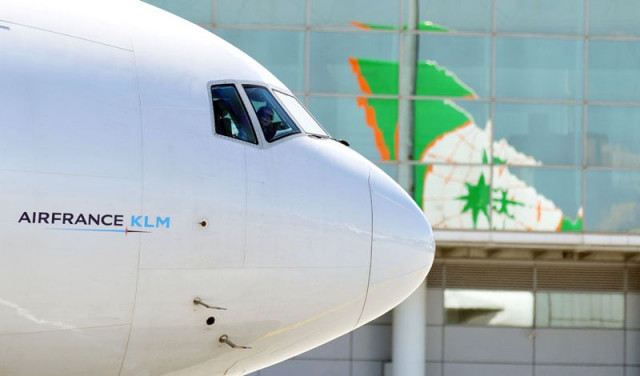Untapped potential in the aviation industry
Students of an aviation institute succeed in securing jobs during studies.

“I decided to quit the UET entry test after I visited the institute. The decision I took has now benefited me greatly; I have been picked by Air Blue as a trainee engineer within two years of my enrollment in the Aircraft Maintenance Engineers Training Institute (Ameti),” Ali says, while talking to The Express Tribune.
Ali is one of six under-training aircraft maintenance engineers from Ameti recently recruited by Air Blue – a private airline operating out of Pakistan. They all will be paid Rs18,000 per month, along with other benefits, while working as trainees. Ali is hopeful that, once he obtains a licence from the Civil Aviation Authority (CAA), his salary will rise to the six digits.
The masses, however, are generally unaware of the potential of the aviation industry – mainly due to a lack of publicity and private investment in the establishment of industry-related training institutes.
“Karachi has some knowledge of this field but Lahore lags far behind. Keeping in view the growing demands of the industry, I took an initiative to start a private institute,” says Tahir Hassan Zaidi, patron-in-chief of Ameti. “Isn’t it amazing that before completing their three years of initial study and on-ground training they have a job in their hand? Which other qualification offers such opportunity?”
Besides the students already mentioned, another six have been picked as trainee engineers by the same company, says Zaidi. All students who succeed in obtaining a licence from the CAA will be picked by different airlines: demand is growing as the global aviation industry expands, he observes.
Apart from the six students hired by Air Blue, Ameti currently has 55 other students enrolled in its training programmes. The number also includes five female students who wish to be part of the aviation industry.
Private institutes like Ameti train students to appear for a licencing exam conducted by the CAA. The course programme is spread over three years, during which students study theory and obtain on ground training working with different aircrafts. The CAA is bound to take the examination after every three months, but conduct it, instead, only once or twice a year. With around 16 engineers required for a single aircraft, Pakistan’s aviation industry is already facing a shortage of trained engineers due to the introduction of new operators and expansion in current airlines.
The aviation industry of Pakistan has suffered neglect by successive governments and the private sector, despite its huge potential in job creation. To date, Pakistan has produced only 2,185 aircraft maintenance engineers over the 63 years since its creation. Most of them have studied abroad or worked with Pakistan International Airlines (PIA). PIA and Shaheen Airlines operate their own engineering schools where they instruct engineers, who then serve their respective carriers after obtaining a licence.
Published in The Express Tribune, March 24th, 2012.



















COMMENTS
Comments are moderated and generally will be posted if they are on-topic and not abusive.
For more information, please see our Comments FAQ